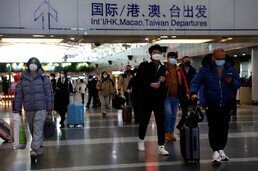
Swift Relief Measures Needed to Safeguard Airport Jobs and Connectivity
- 27 Mar 2020
Airports Council International (ACI) Asia-Pacific is urging governments across the Asia-Pacific and Middle East region to swiftly implement relief measures to safeguard airport employment and connectivity. Revised ACI revenue forecasts show the 2020 impact of the pandemic now stands at US$23.9B for Asia-Pacificand US$5.7B for the Middle East, impacting airports of all sizes. A prolonged outbreak may result in a traffic volume loss in the range of 1.5 billion passengers for the Asia-Pacific region.
The airport industry in Asia-Pacific and the Middle East employs more than 63% of aviation industry jobs*, providing a variety of services ranging from airport management, maintenance, and security to retail outlets, food and beverage and duty-free concessionaires.
Taking into account the rapid developments, ACI estimates place the first quarter loss in Asia-Pacific in the range of US$5.6 billion, almost double earlier estimates, a large portion of which comes from the contraction in traffic as well as non-aeronautical revenue. The impact on the Middle East will generate a loss of approximately US$1 billion for the first quarter and at least double for the full year.
“The updated analysis paints an extremely challenging picture for our airport members who have already burnt through about 10% of total yearly revenues in just three months. Every passenger lost by an airline is equally a passenger lost by an airport,” said Stefano Baronci, Director General of ACI Asia-Pacific. “Relief measures are needed now for the sake of the entire aviation sector’s resilience to save jobs and allow economic recovery.”
The crisis is impacting airports of all sizes. Analysis of preliminary weekly passenger data from January to the middle of March at 12 major hubs in Asia-Pacific handling around 22% of traffic in the region, shows the increasing traffic deterioration, culminating in an average decrease in traffic by more than 80% by the second week of March compared to the same period in 2019.
A number of small airports in the region, those defined by handling less than one million passengers per year, are also heavily affected by the crisis and resulting drop in traffic. The role played by airport networks in several countries in Asia-Pacific and the Middle East will be essential to enable the long-term social and economic benefits of connectivity. ACI Asia-Pacific recommends dedicated funding to keep these small airports operating and ensuring their economic sustainability.
“Legislators have to carefully balance survival and revival measures, addressing both the urgency of short-term needs with smart initiatives that will also facilitate a strong recovery down the road. Several governments are still pondering which measures to apply as the crisis unfolds. ACI Asia-Pacific strongly advocates for policy measures that benefit all parties of the aviation sectors without prejudice in favouring airlines,” added Baronci.
Specifically, ACI Asia-Pacific is calling on governments and regulators to act now and implement the following measures:
1. Alleviation of airport slots usage requirements until the end of June 2020: The temporary suspension of airport slot usage requirements would enable carriers to adjust their schedules in a sustainable way and for airports to protect connecting traffic at hub airports, safeguarding connectivity worldwide. Extension of the temporary suspension beyond June needs to be supported by continuous analysis and flexibly exercised per specific market conditions, as seen in China’s approach for international traffic and airline load factors.
2. Tax relief for the aviation sector: This includes suspension or deferment of social security contributions as well as corporate and other taxes (including VAT and excise duties). Suspension of all national and local aviation specific taxes, including passenger departing taxes.
3. Suspension or deferment of airport operators’ concession fees to governments: Governments need to consider, on a case-by-case basis, waiving airport rents and concession fees applicable to airport operators, irrespective of ownership status, given the financial stress they are experiencing.
4. Protection of airport revenues to finance operations, and bear high fixed cost.: Airports are reliant on revenue from charges on airlines, passengers and commercial activities. Any global alleviation of airport charges or introduction of blanket discounts, therefore, will place airport operators in greater financial distress.
5. Government financial assistance: In some circumstances, seeking government subsidies to safeguard the ability of airport operators to contribute to economic growth and employment by ensuring current and future strategic investment in capacity, digitalization, accessibility and sustainability. These measures should be contemplated especially in support of regional airports
*Data from Air Transport Action Group Aviation Benefits Beyond Borders [2018]
- CATEGORY
- COUNTRY / AREA
- Asia-Pacific and the Middle East
- AUTHOR
- CommunicationsACI Asia-Pacific









